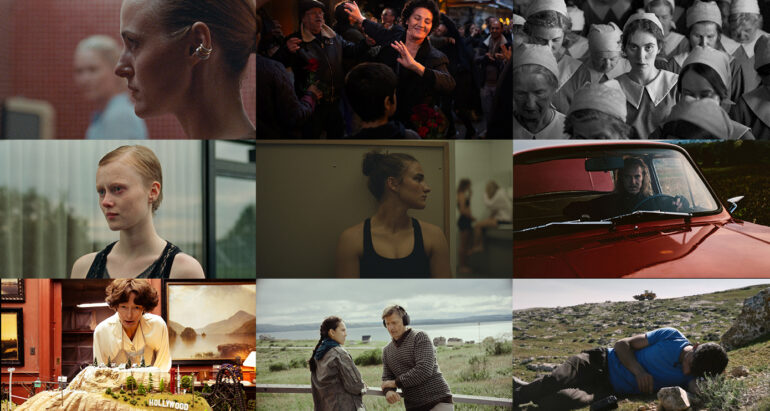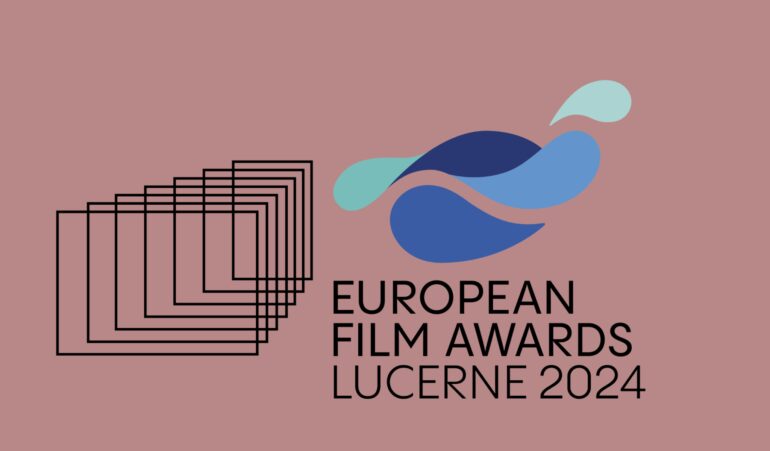WRITTEN BY: Aleksander Huser
Six Nordic majority productions and two minority co-productions are shortlisted for the European Film Awards 2024. One Nordic co-production is also among the shortlisted documentaries.
The European Film Awards 2024 will take place in Lucerne, Switzerland on December 7, and honour the greatest achievements in European cinema. All 45 titles in the Feature Film Selection for the 37th European Film Awards have now been announced, as well as the Documentary Film Selection.
In mid-August, the European Film Academy announced 29 productions as the first part of the Feature Film Selection, chosen among European features that had their first official screening between 1 June 2023 and 31 May 2024. In this selection were the Nordic majority productions Armand, Crossing (Passage), The Girl with the Needle (Pigen med nålen) and When the Light Breaks (Ljósbrot), as well as the minority co-productions Julie Keeps Quiet (Julie Zwijgt) and The Invisible Fight (Nähtamatu võitlus).
On September 26, 16 further features which had their premiere at the summer and early autumn festivals were added to the selection. Among these were the Nordic majority productions The End and My Father’s Daughter (Biru Unjárga).
The 45 films in this year’s feature film shortlist have been selected by the European Film Academy’s Board, consulted by a diverse range of invited European experts.
In addition, the European Film Academy announced the 12 feature-length documentaries in the Documentary Film Selection on August 21, chosen by a committee consisting of a similarly diverse range of invited European expert. Among the films in this selection, which premiered between 1 June 2023 and 31 May 2024, is the Nordic co-production No Other Land.
The 5,000 members of the Academy have now begun to watch and vote for the films from the selections. Based on the votes, the nominations will be announced on November 5 in the feature film categories European Film, Director, Actor, Actress and Screenwriter, as well as European Documentary, European Discovery and Young Audience Award.
The shortlisted Nordic majority productions in the Feature Film Selection:
Norwegian writer/director Halfdan Ullmann Tøndel’s Armand won the prestigious Caméra d’Or first feature award at this year’s Cannes festival, where it screened in the Un Certain Regard section. With an ensemble cast led by Renate Reinsve, the story centres around a meeting between parents and teachers at an elementary school to discuss the young boy Armand’s alleged disturbing behaviour. The Norwegian/Dutch/German/Swedish film is produced by Andrea Berentsen Ottmar for the Norwegian company Eye Eye Pictures, in co-production with Keplerfilm, One Two Films, Prolaps Produktion and Film i Väst.
Swedish writer/director Levan Akin’s feature film Crossing premiered at the Berlinale, where it opened the Panorama section and won the Teddy Jury Award. The trans themed drama tells the story of a retired Georgian teacher who sets off to Istanbul with her young neighbour in search of her long-lost niece, with Mzia Arabuli, Lucas Kankava and Deniz Dumanlı in leading roles. The Swedish/French/Danish/Turkish/Georgian film Crossing is produced by Mathilde Dedyefor French Quarter Film. Co-producers are RMV, SVT, Adomeit Film, Easy Riders Films, Bir Film and 1991 Productions. Crossing is nominated as Sweden’s candidate for the Nordic Council Film Prize 2024.
The “Golden Age musical” The End is the twice Oscar-nominated documentary director Joshua Oppenheimer’s first narrative feature, and premiered at the Telluride Film Festival. Portraying one of the last families on earth, which lives in a luxurious underground compound 25 years after the planet’s environmental collapse, the English language film stars Tilda Swinton, George MacKay, Moses Ingram and Michael Shannon. The End is produced by Signe Byrge Sørensen for Final Cut for Real, with Oppenheimer and Swinton also producing. Co-producers of the Danish majority production are Wild Atlantic (Ireland), The Match Factory (Germany), Dorje Film (Italy), Moonspun Films (UK) and Sweden’s Anagram.
Also a Danish majority production, The Girl with the Needle is directed and co-written by Swede Magnus von Horn, and was selected for the main competition in Cannes. Inspired by true events and starring Vic Carmen Sonne and Trine Dyrholm, this unsettling and stylishly executed drama is set in Copenhagen shortly after World War I. The Danish/Polish/Swedish feature’s producers are Malene Blenkov and Mariusz Włodarski for Nordisk Film Production in Denmark, with Lava Films, EC1 ŁÓDŹ, Lower Silesia Film Centre, Film i Väst and Nordisk Film Sweden as co-producing companies.
Set in the northernmost parts of Norway, writer/director Egil Pedersen’s feature debut My Father’s Daughter centres on the Sámi teenager Elvira, played by Sarah Olaussen Eira. Not really fitting in at the Sámi village of Unjárga, and convinced that her mother conceived her at a Danish fertility clinic, Elvira’s world changes dramatically with the emergence of her real father. My Father’s Daughter is the first youth-oriented Sámi feature, and premiered at the Toronto International Film Festival. My Father’s Daughter is produced by Norway’s Mathis Ståle Mathisen and Aleksander Olai Korsnes for Rein Film and Pål Røed for Paasan, in co-production with Finnish company Oktober as well as Bautafilm and Filmpool Nord from Sweden.
Iceland’s When the Light Breaks (Ljósbrot), written and directed by Rúnar Rúnarsson, was the opening film of the Cannes festival’s Un Certain Regard section. The nuanced and intimate drama depicts a young art student, played by Elín Hall, who loses a loved one without being able to truly share her emotions, because her romantic relationship with him was still a secret to their group of friends. When the Light Breaks is produced by Heather Millard at Compass Films, with Halibut, Revolver Amsterdam, Eaux Vives Productions and Jour2Fête co-producing the Icelandic/Dutch/Croatian/French feature.
Crossing, The End, The Girl with the Needle, My Father’s Daughter and When the Light Breaks have received funding from Nordisk Film & TV Fond.
The shortlisted Nordic minority productions in the Feature Film Selection:
Belgian Leonardo Van Dijl’s Julie Keeps Quiet premiered in the Critics’ Week section in Cannes, where it won the SACD Award for Best Screenplay, written by helmer Van Dijl and Ruth Becquart, and the Gan Foundation Award for Distribution. The film’s main character, named in its title, is a young tennis prodigy whose coach falls under investigation. When the players at the elite academy are encouraged to speak up about the suspended coach’s conduct, Julie keeps quiet. This Belgian/Swedish film is produced by Belgian company De Wereldvrede, with the Dardenne brothers’ Les Films du Fleuve as well as Sweden’s Hobab (Nima Yousefi) and Film i Väst (Kristina Börjeson and Anthony Muir) co-producing. Julie Keeps Quiet is also nominated for the LUX Audience Award 2025.
Estonian writer/director Rainer Sarnet’s The Invisible Fight world premiered in the main competition at last year’s Locarno festival. Set in 1973, this martial arts comedy tells the story of a young guard at the Soviet-Chinese border who decides to become a kung fu warrior – and therefore has to become a monk in an Orthodox monastery. The Estonian/Greek/Latvian/Finnish feature is produced by Homeless Bob Production from Estonia, with Neda Film, White Picture and Finland’s Helsinki-Filmi (Helen Vinogradov and Aleksi Bardy) co-producing.
The shortlisted Nordic co-production in the Documentary Film Selection:
The Palestinian/Norwegian No Other Land premiered in the Berlinale’s Panorama section, where it won the Panorama Audience Award for Best Documentary Film as well as the Berlinale Documentary Film Award, and has since received several other awards. Directed by Yuval Abraham, Rachel Szor, Basel Adra, Hamdan Ballal, a Palestinian-Israeli collective of activists and filmmakers, and produced by Fabien Greenberg and Bård Kjøge Rønning from Norway’s Antipode Films, No Other Land depicts the eradication of Palestinian villages by Israeli soldiers and settlers in the West Bank’s Masafer Yatta area.
Eligible for the Feature and Documentary Film selections are European productions which, among other criteria, must have a European director. Exceptions to the latter criterion can be given “provided they have a European refugee or similar status or have lived in Europe and worked in the European film industry for at least five consecutive years”.
The winners will be announced on December 7 at the 37th European Film Awards ceremony in the Lucerne Culture and Congress Centre (KKL Luzern) in Switzerland. The awards ceremony is presented jointly by the European Film Academy and European Film Academy Production.
The selected features will also be considered for Excellence Awards in the categories European Cinematography, Editing, Production Design, Costume Design, Make-up & Hair, Original Score, Sound, and Visual Effects. These awards will be decided by an eight-member jury consisting of representatives of the different arts and crafts, with no nominations in these categories.
Among the other films in the Feature Film Selection are Bird by Andrea Arnold, Emilia Pérez by Jacques Audiard, Miguel Gomes*‘s Grand Tour*, Yorgos Lanthimos’ Kinds of Kindness, The Seed of the Sacred Fig (Daneh Anjeer Moghadas) by Mohammad Rasoulof, The Substance by Coralie Fargeat and Emanuel Pârvu’s Three Kilometres to the End of the World (Trei kilometri până la capătul lumii), all from the main competition in Cannes. From this year’s Venice competition is Pedro Almodóvar’s Golden Lion winner The Room Next Door, as well as April by Dea Kulumbegashvili, Athina Rachel Tsangari’s Harvest and Maura Delpero’s Vermiglio.
Further feature film titles include Mike Leigh’s Hard Truths, which premiered in Toronto, Saulė Bliuvaitė’s top Locarno prize winner Toxic (Akiplėša), Rich Peppiatt’s Kneecap, which won the Audience Award in the NEXT section at Sundance, and Berlinale award-winners Dying (Sterben) by Matthias Glasner and The Devil’s Bath (Des Teufels Bad) by Veronika Franz and Severin Fiala.
In the Documentary Film Selection, we find Mati Diop’s Golden Bear winner Mahomey together with My Stolen Planet(Sayyareye dozdide shodeye man) by Farahnaz Sharif and Nicolas Philibert’s At Averroès & Rosa Parks (Averroès & Rosa Parks), to mention some Berlinale titles in addition to No Other Land.
Turning to the short format, four Nordic shorts are listed among the 28 candidates for the European Short Film award 2024, which will also be announced at the ceremony on December 7. These are A Study of Empathy (En undersøgelse af empati) by Hilke Rönnfeldt (Denmark/Germany, fiction, 15’), In the Midst of Chaos there was Shape (Leikkejä eläville) by Saarlotta Virri (Finland, documentary, 17′), The Death of a Hero (En hjältes död) by Karin Franz Körlof (Sweden, fiction, 14’) and The Film Might Be White (Filmen känns för vit) by Sebastian Johansson Micci (Sweden, fiction, 14′).
To see the complete list of the EFA Feature Film Selection, Documentary Film Selection and short film candidates: CLICK HERE.

